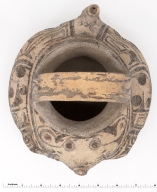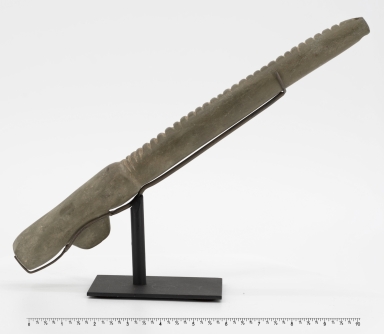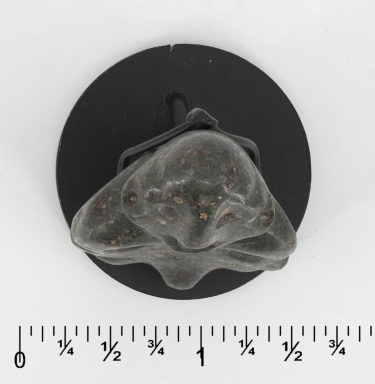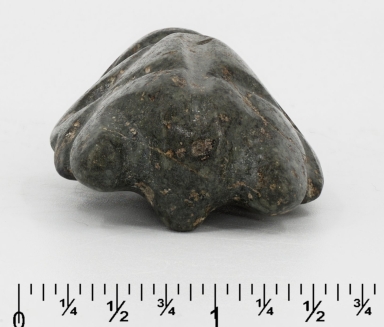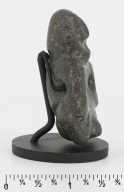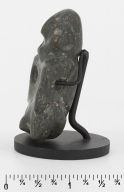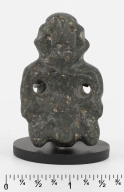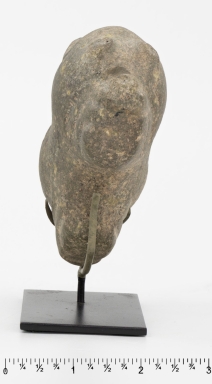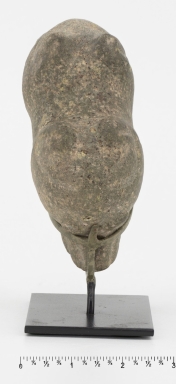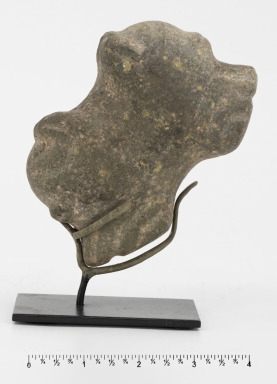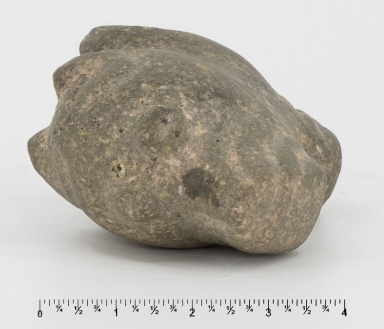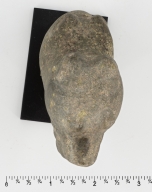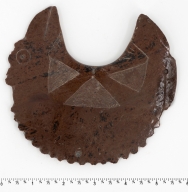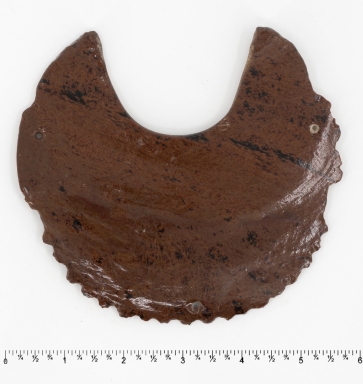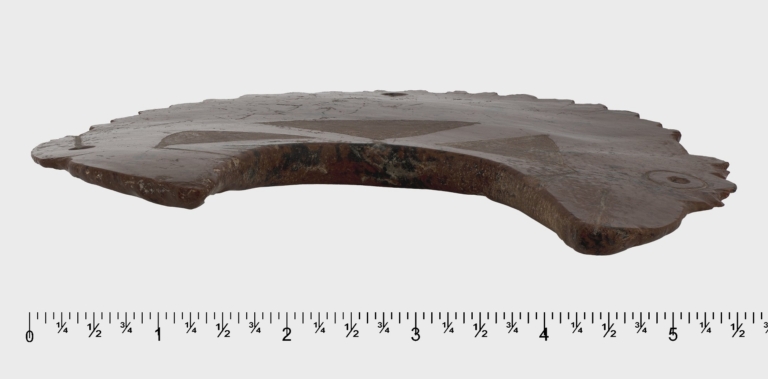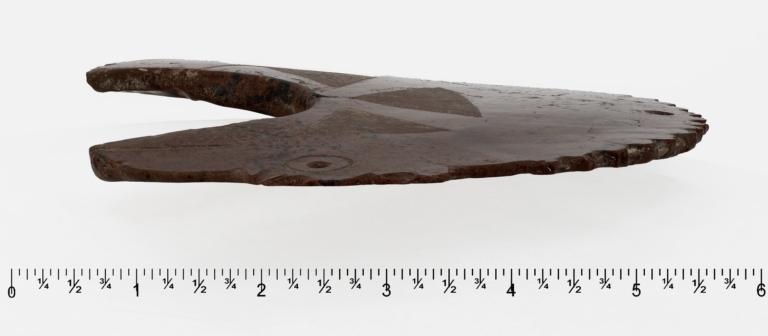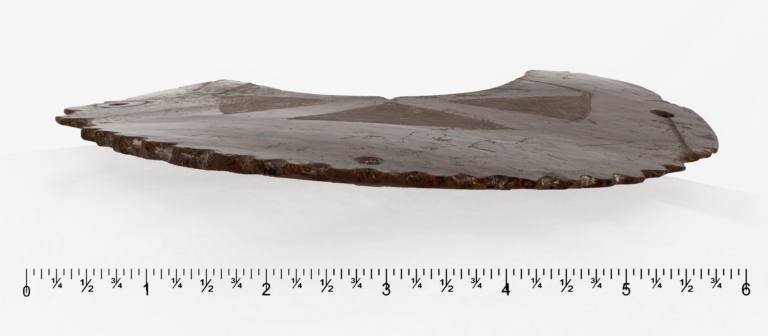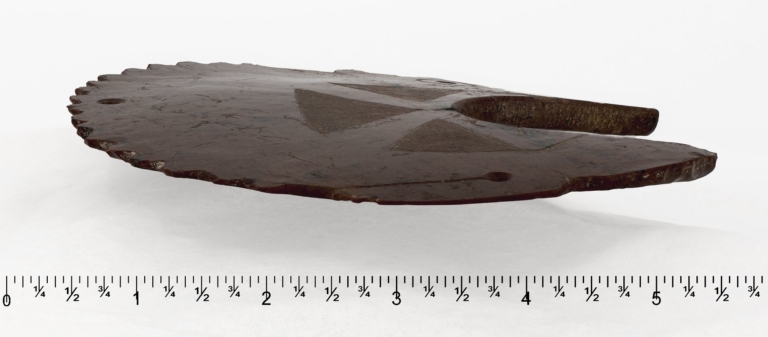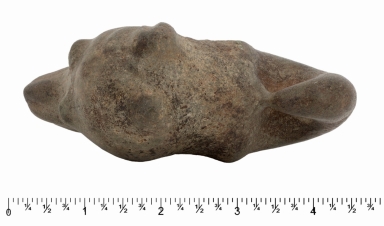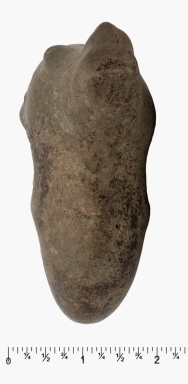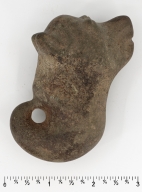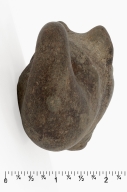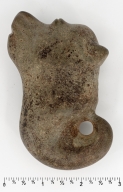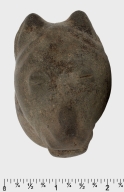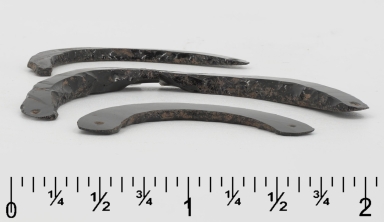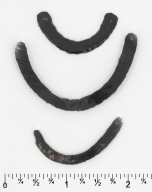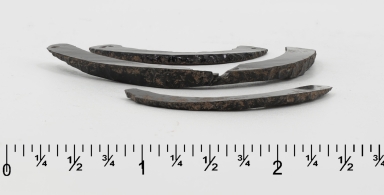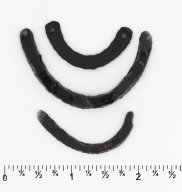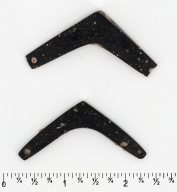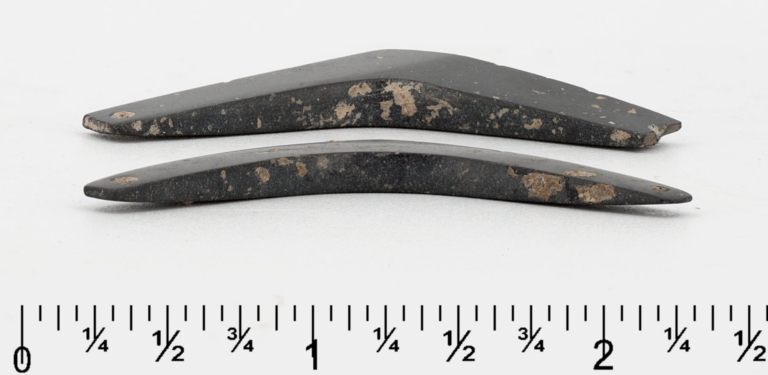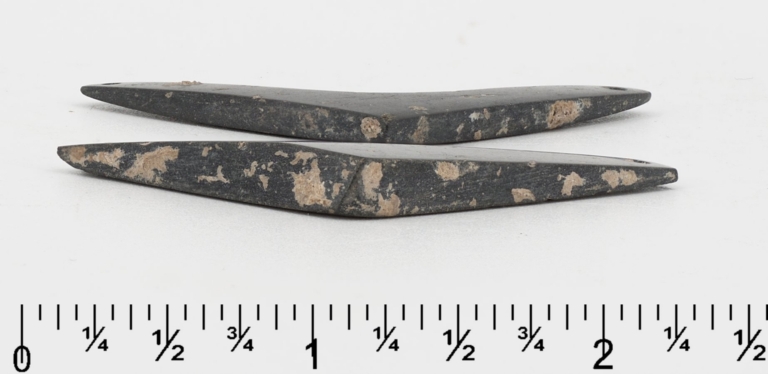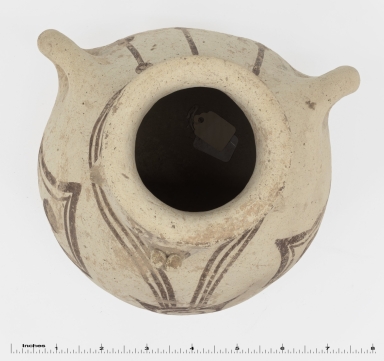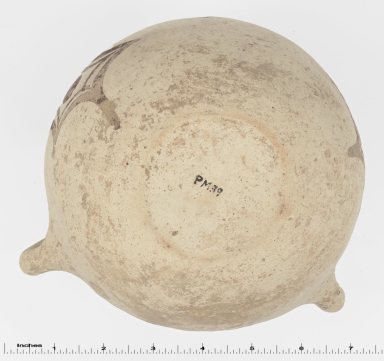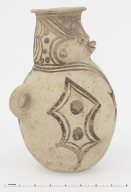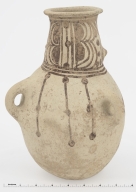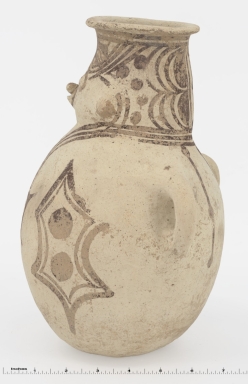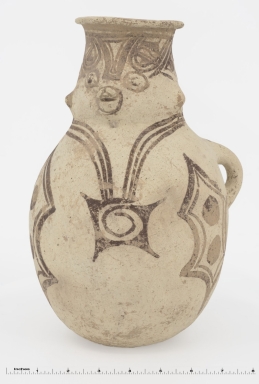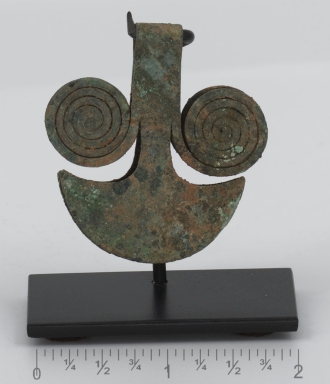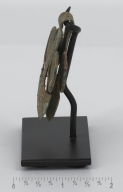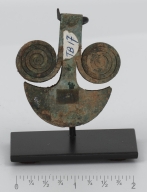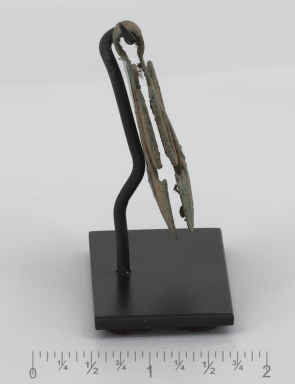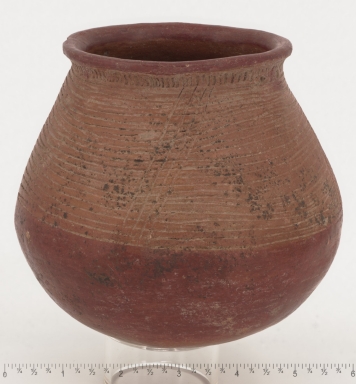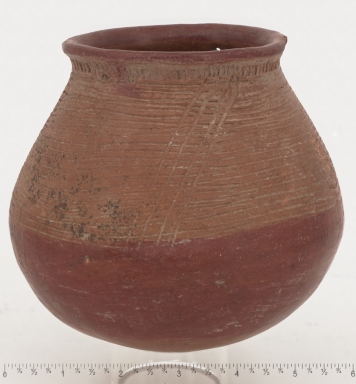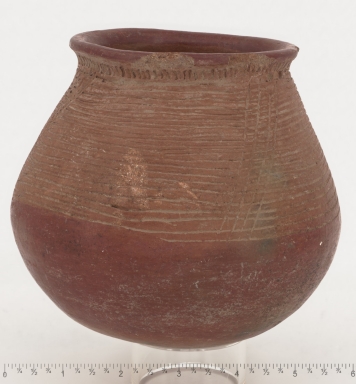|
Title
Large huastec zoomorphic pouring vessel.
Description
A zoomorphic vessel resembling a rodent-like creature with an elaborately painted body. The strap handle facilitates handling and the tail spout allows for control pouring. In Mesoamerica the number three refers to the three realms; the heavens or the sky, the earth or the living world, and the underworld or the land of the dead.
Subject
[Ceramic tableware--Mexico--Pánuco River, Ceramic sculpture--Mexico--Pánuco River, Huastec art--Mexico--Pánuco River, Indigenous peoples--Antiquities]
Date
between 900 and 1450
Title
Anthropomorphic musical rasp.
Description
Ceramic Nayarit musicians demonstrate how a rasp was held, played, and looked. A grooved rasp was played with a bore, a shell or wooden object that was dragged over the grooves to produce an unusual sound.
Subject
[Files and rasps, Percussion instruments--Mexico--Colima (State), Art--Mexico--Colima (State), Indigenous peoples--Antiquities]
Date
between 250 B.C. and 250 A.D.
Title
Anthropomorphic musical rasp.
Description
Ceramic Nayarit musicians demonstrate how a rasp was held, played, and looked. A grooved rasp was played with a bore, a shell or wooden object that was dragged over the grooves to produce an unusual sound.
Subject
[Files and rasps, Percussion instruments--Mexico--Colima (State), Art--Mexico--Colima (State), Indigenous peoples--Antiquities]
Date
between 250 B.C. and 250 A.D.
Title
Anthropomorphic musical rasp.
Description
Ceramic Nayarit musicians demonstrate how a rasp was held, played, and looked. A grooved rasp was played with a bore, a shell or wooden object that was dragged over the grooves to produce an unusual sound.
Subject
[Files and rasps, Percussion instruments--Mexico--Colima (State), Art--Mexico--Colima (State), Indigenous peoples--Antiquities]
Date
between 250 B.C. and 250 A.D.
Title
Anthropomorphic musical rasp.
Description
Ceramic Nayarit musicians demonstrate how a rasp was held, played, and looked. A grooved rasp was played with a bore, a shell or wooden object that was dragged over the grooves to produce an unusual sound.
Subject
[Files and rasps, Percussion instruments--Mexico--Colima (State), Art--Mexico--Colima (State), Indigenous peoples--Antiquities]
Date
between 250 B.C. and 250 A.D.
Title
Colima anthropomorphic, zoomorphic figure.
Description
The eyes, ears, mouth, and spine were inlaid in this figurative deep blue-green stone. The stone's image is obviously male, but less apparent are the secondary front and rear faces. Lay the stone stomach down, it transforms into a resting frog, the symbol of fertility. The stone transforms from a man to a frog and maybe a dog.
Subject
[Sculpture--Mexico--Colima (State), Stone carving--Mexico--Colima (State), Art--Mexico--Colima (State), Indigenous peoples--Antiquities]
Date
between 300 B.C. and 300 A.D.
Title
Colima anthropomorphic, zoomorphic figure.
Description
The eyes, ears, mouth, and spine were inlaid in this figurative deep blue-green stone. The stone's image is obviously male, but less apparent are the secondary front and rear faces. Lay the stone stomach down, it transforms into a resting frog, the symbol of fertility. The stone transforms from a man to a frog and maybe a dog.
Subject
[Sculpture--Mexico--Colima (State), Stone carving--Mexico--Colima (State), Art--Mexico--Colima (State), Indigenous peoples--Antiquities]
Date
between 300 B.C. and 300 A.D.
Title
Colima anthropomorphic, zoomorphic figure.
Description
The eyes, ears, mouth, and spine were inlaid in this figurative deep blue-green stone. The stone's image is obviously male, but less apparent are the secondary front and rear faces. Lay the stone stomach down, it transforms into a resting frog, the symbol of fertility. The stone transforms from a man to a frog and maybe a dog.
Subject
[Sculpture--Mexico--Colima (State), Stone carving--Mexico--Colima (State), Art--Mexico--Colima (State), Indigenous peoples--Antiquities]
Date
between 300 B.C. and 300 A.D.
Title
Colima anthropomorphic, zoomorphic figure.
Description
The eyes, ears, mouth, and spine were inlaid in this figurative deep blue-green stone. The stone's image is obviously male, but less apparent are the secondary front and rear faces. Lay the stone stomach down, it transforms into a resting frog, the symbol of fertility. The stone transforms from a man to a frog and maybe a dog.
Subject
[Sculpture--Mexico--Colima (State), Stone carving--Mexico--Colima (State), Art--Mexico--Colima (State), Indigenous peoples--Antiquities]
Date
between 300 B.C. and 300 A.D.
Title
Colima anthropomorphic, zoomorphic figure.
Description
The eyes, ears, mouth, and spine were inlaid in this figurative deep blue-green stone. The stone's image is obviously male, but less apparent are the secondary front and rear faces. Lay the stone stomach down, it transforms into a resting frog, the symbol of fertility. The stone transforms from a man to a frog and maybe a dog.
Subject
[Sculpture--Mexico--Colima (State), Stone carving--Mexico--Colima (State), Art--Mexico--Colima (State), Indigenous peoples--Antiquities]
Date
between 300 B.C. and 300 A.D.
Title
Colima anthropomorphic, zoomorphic figure.
Description
The eyes, ears, mouth, and spine were inlaid in this figurative deep blue-green stone. The stone's image is obviously male, but less apparent are the secondary front and rear faces. Lay the stone stomach down, it transforms into a resting frog, the symbol of fertility. The stone transforms from a man to a frog and maybe a dog.
Subject
[Sculpture--Mexico--Colima (State), Stone carving--Mexico--Colima (State), Art--Mexico--Colima (State), Indigenous peoples--Antiquities]
Date
between 300 B.C. and 300 A.D.
Title
Macehead : transforming images : 2.
Description
A macehead is a symbol of power, authority, and an object of destruction. The dog heads could represent food, companionship, warmth, or a guide or visitor to the underworld. Turn the macehead over and there are two horned frogs, a good source of a hallucinogenic drug. The poison allowed a shaman access to other worlds. The frog is associated with renewal, change, or transformation and fertility.
Subject
[Sculpture--Mexico--Colima (State), Stone carving--Mexico--Colima (State), Art--Mexico--Colima (State), Indigenous peoples--Antiquities]
Date
between 250 B.C. and 200 A.D.
Title
Macehead : transforming images : 2.
Description
A macehead is a symbol of power, authority, and an object of destruction. The dog heads could represent food, companionship, warmth, or a guide or visitor to the underworld. Turn the macehead over and there are two horned frogs, a good source of a hallucinogenic drug. The poison allowed a shaman access to other worlds. The frog is associated with renewal, change, or transformation and fertility.
Subject
[Sculpture--Mexico--Colima (State), Stone carving--Mexico--Colima (State), Art--Mexico--Colima (State), Indigenous peoples--Antiquities]
Date
between 250 B.C. and 200 A.D.
Title
Macehead : transforming images : 2.
Description
A macehead is a symbol of power, authority, and an object of destruction. The dog heads could represent food, companionship, warmth, or a guide or visitor to the underworld. Turn the macehead over and there are two horned frogs, a good source of a hallucinogenic drug. The poison allowed a shaman access to other worlds. The frog is associated with renewal, change, or transformation and fertility.
Subject
[Sculpture--Mexico--Colima (State), Stone carving--Mexico--Colima (State), Art--Mexico--Colima (State), Indigenous peoples--Antiquities]
Date
between 250 B.C. and 200 A.D.
Title
Macehead : transforming images : 2.
Description
A macehead is a symbol of power, authority, and an object of destruction. The dog heads could represent food, companionship, warmth, or a guide or visitor to the underworld. Turn the macehead over and there are two horned frogs, a good source of a hallucinogenic drug. The poison allowed a shaman access to other worlds. The frog is associated with renewal, change, or transformation and fertility.
Subject
[Sculpture--Mexico--Colima (State), Stone carving--Mexico--Colima (State), Art--Mexico--Colima (State), Indigenous peoples--Antiquities]
Date
between 250 B.C. and 200 A.D.
Title
Macehead : transforming images : 2.
Description
A macehead is a symbol of power, authority, and an object of destruction. The dog heads could represent food, companionship, warmth, or a guide or visitor to the underworld. Turn the macehead over and there are two horned frogs, a good source of a hallucinogenic drug. The poison allowed a shaman access to other worlds. The frog is associated with renewal, change, or transformation and fertility.
Subject
[Sculpture--Mexico--Colima (State), Stone carving--Mexico--Colima (State), Art--Mexico--Colima (State), Indigenous peoples--Antiquities]
Date
between 250 B.C. and 200 A.D.
Title
Macehead : transforming images : 2.
Description
A macehead is a symbol of power, authority, and an object of destruction. The dog heads could represent food, companionship, warmth, or a guide or visitor to the underworld. Turn the macehead over and there are two horned frogs, a good source of a hallucinogenic drug. The poison allowed a shaman access to other worlds. The frog is associated with renewal, change, or transformation and fertility.
Subject
[Sculpture--Mexico--Colima (State), Stone carving--Mexico--Colima (State), Art--Mexico--Colima (State), Indigenous peoples--Antiquities]
Date
between 250 B.C. and 200 A.D.
Title
Mahogany obsidian pectoral.
Description
This crescent-shaped pectoral has two pointed ends, which can be interpreted as a two-headed bird, a caiman, or an iguana. The pectoral represents duality and transformation.
Subject
[Stone carving--Mexico--Colima (State), Art--Mexico--Colima (State), Indigenous peoples--Antiquities]
Date
between 250 B.C. and 250 A.D.
Title
Mahogany obsidian pectoral.
Description
This crescent-shaped pectoral has two pointed ends, which can be interpreted as a two-headed bird, a caiman, or an iguana. The pectoral represents duality and transformation.
Subject
[Stone carving--Mexico--Colima (State), Art--Mexico--Colima (State), Indigenous peoples--Antiquities]
Date
between 250 B.C. and 250 A.D.
Title
Mahogany obsidian pectoral.
Description
This crescent-shaped pectoral has two pointed ends, which can be interpreted as a two-headed bird, a caiman, or an iguana. The pectoral represents duality and transformation.
Subject
[Stone carving--Mexico--Colima (State), Art--Mexico--Colima (State), Indigenous peoples--Antiquities]
Date
between 250 B.C. and 250 A.D.
Title
Mahogany obsidian pectoral.
Description
This crescent-shaped pectoral has two pointed ends, which can be interpreted as a two-headed bird, a caiman, or an iguana. The pectoral represents duality and transformation.
Subject
[Stone carving--Mexico--Colima (State), Art--Mexico--Colima (State), Indigenous peoples--Antiquities]
Date
between 250 B.C. and 250 A.D.
Title
Mahogany obsidian pectoral.
Description
This crescent-shaped pectoral has two pointed ends, which can be interpreted as a two-headed bird, a caiman, or an iguana. The pectoral represents duality and transformation.
Subject
[Stone carving--Mexico--Colima (State), Art--Mexico--Colima (State), Indigenous peoples--Antiquities]
Date
between 250 B.C. and 250 A.D.
Title
Mahogany obsidian pectoral.
Description
This crescent-shaped pectoral has two pointed ends, which can be interpreted as a two-headed bird, a caiman, or an iguana. The pectoral represents duality and transformation.
Subject
[Stone carving--Mexico--Colima (State), Art--Mexico--Colima (State), Indigenous peoples--Antiquities]
Date
between 250 B.C. and 250 A.D.
Title
Macehead : transforming images : 4.
Description
A macehead can symbolize power and authority, but this macehead represents transformation. All the animals depicted on this macehead have the ability to move symbolically or physically from the underworld to the living world to the heavens of gods and ancestors. Individually, they represent different concepts: abundance, fertility, rebirth, renewal, and transformation.
Subject
[Stone carving--Mexico--Colima (State), Sculpture--Mexico--Colima (State), Art--Mexico--Colima (State), Indigenous peoples--Antiquities]
Date
between 300 B.C. and 300 A.D.
Title
Macehead : transforming images : 4.
Description
A macehead can symbolize power and authority, but this macehead represents transformation. All the animals depicted on this macehead have the ability to move symbolically or physically from the underworld to the living world to the heavens of gods and ancestors. Individually, they represent different concepts: abundance, fertility, rebirth, renewal, and transformation.
Subject
[Stone carving--Mexico--Colima (State), Sculpture--Mexico--Colima (State), Art--Mexico--Colima (State), Indigenous peoples--Antiquities]
Date
between 300 B.C. and 300 A.D.
Title
Macehead : transforming images : 4.
Description
A macehead can symbolize power and authority, but this macehead represents transformation. All the animals depicted on this macehead have the ability to move symbolically or physically from the underworld to the living world to the heavens of gods and ancestors. Individually, they represent different concepts: abundance, fertility, rebirth, renewal, and transformation.
Subject
[Stone carving--Mexico--Colima (State), Sculpture--Mexico--Colima (State), Art--Mexico--Colima (State), Indigenous peoples--Antiquities]
Date
between 300 B.C. and 300 A.D.
Title
Macehead : transforming images : 4.
Description
A macehead can symbolize power and authority, but this macehead represents transformation. All the animals depicted on this macehead have the ability to move symbolically or physically from the underworld to the living world to the heavens of gods and ancestors. Individually, they represent different concepts: abundance, fertility, rebirth, renewal, and transformation.
Subject
[Stone carving--Mexico--Colima (State), Sculpture--Mexico--Colima (State), Art--Mexico--Colima (State), Indigenous peoples--Antiquities]
Date
between 300 B.C. and 300 A.D.
Title
Macehead : transforming images : 4.
Description
A macehead can symbolize power and authority, but this macehead represents transformation. All the animals depicted on this macehead have the ability to move symbolically or physically from the underworld to the living world to the heavens of gods and ancestors. Individually, they represent different concepts: abundance, fertility, rebirth, renewal, and transformation.
Subject
[Stone carving--Mexico--Colima (State), Sculpture--Mexico--Colima (State), Art--Mexico--Colima (State), Indigenous peoples--Antiquities]
Date
between 300 B.C. and 300 A.D.
Title
Macehead : transforming images : 4.
Description
A macehead can symbolize power and authority, but this macehead represents transformation. All the animals depicted on this macehead have the ability to move symbolically or physically from the underworld to the living world to the heavens of gods and ancestors. Individually, they represent different concepts: abundance, fertility, rebirth, renewal, and transformation.
Subject
[Stone carving--Mexico--Colima (State), Sculpture--Mexico--Colima (State), Art--Mexico--Colima (State), Indigenous peoples--Antiquities]
Date
between 300 B.C. and 300 A.D.
Title
Obsidian jewelry : crescent-shaped pectorals.
Description
Obsidian is a hard, black volcanic glass that can be worked with ease. Mesoamericans knocked off thin layers or blades from an obsidian core and further refined or shaped their tools or objects by pressing or pushing off small pieces of the stone. Blades were further flattened or worn away with abrasive grits or sands. Holes were drilled or knocked into the blade. These obsidian crescent pendants (jewelry) have been created using the above process.
Subject
[Jewelry--Mexico--Jalisco, Stone carving--Mexico--Jalisco, Art--Mexico--Jalisco, Indigenous peoples--Antiquities, Obsidian]
Date
between 250 B.C. and 250 A.D.
Title
Obsidian jewelry : crescent-shaped pectorals.
Description
Obsidian is a hard, black volcanic glass that can be worked with ease. Mesoamericans knocked off thin layers or blades from an obsidian core and further refined or shaped their tools or objects by pressing or pushing off small pieces of the stone. Blades were further flattened or worn away with abrasive grits or sands. Holes were drilled or knocked into the blade. These obsidian crescent pendants (jewelry) have been created using the above process.
Subject
[Jewelry--Mexico--Jalisco, Stone carving--Mexico--Jalisco, Art--Mexico--Jalisco, Indigenous peoples--Antiquities, Obsidian]
Date
between 250 B.C. and 250 A.D.
Title
Obsidian jewelry : crescent-shaped pectorals.
Description
Obsidian is a hard, black volcanic glass that can be worked with ease. Mesoamericans knocked off thin layers or blades from an obsidian core and further refined or shaped their tools or objects by pressing or pushing off small pieces of the stone. Blades were further flattened or worn away with abrasive grits or sands. Holes were drilled or knocked into the blade. These obsidian crescent pendants (jewelry) have been created using the above process.
Subject
[Jewelry--Mexico--Jalisco, Stone carving--Mexico--Jalisco, Art--Mexico--Jalisco, Indigenous peoples--Antiquities, Obsidian]
Date
between 250 B.C. and 250 A.D.
Title
Obsidian jewelry : crescent-shaped pectorals.
Description
Obsidian is a hard, black volcanic glass that can be worked with ease. Mesoamericans knocked off thin layers or blades from an obsidian core and further refined or shaped their tools or objects by pressing or pushing off small pieces of the stone. Blades were further flattened or worn away with abrasive grits or sands. Holes were drilled or knocked into the blade. These obsidian crescent pendants (jewelry) have been created using the above process.
Subject
[Jewelry--Mexico--Jalisco, Stone carving--Mexico--Jalisco, Art--Mexico--Jalisco, Indigenous peoples--Antiquities, Obsidian]
Date
between 250 B.C. and 250 A.D.
Title
Stone jewelry : wedge shaped pectoral.
Description
These wedge-shaped pendants were created by core flaking and pressure flaking a soft stone. Once the basic wedge shape was produced, it was refined or flattened with abrasive grits or sands. The holes were drilled for suspending the pectoral.
Subject
[Pendants (Jewelry)--Mexico--Nayarit, Jewelry--Mexico--Nayarit, Stone carving--Mexico--Nayarit, Art--Mexico--Nayarit, Indigenous peoples--Antiquities]
Date
between 250 B.C. and 250 A.D.
Title
Stone jewelry : wedge shaped pectoral.
Description
These wedge-shaped pendants were created by core flaking and pressure flaking a soft stone. Once the basic wedge shape was produced, it was refined or flattened with abrasive grits or sands. The holes were drilled for suspending the pectoral.
Subject
[Pendants (Jewelry)--Mexico--Nayarit, Jewelry--Mexico--Nayarit, Stone carving--Mexico--Nayarit, Art--Mexico--Nayarit, Indigenous peoples--Antiquities]
Date
between 250 B.C. and 250 A.D.
Title
Stone jewelry : wedge shaped pectoral.
Description
These wedge-shaped pendants were created by core flaking and pressure flaking a soft stone. Once the basic wedge shape was produced, it was refined or flattened with abrasive grits or sands. The holes were drilled for suspending the pectoral.
Subject
[Pendants (Jewelry)--Mexico--Nayarit, Jewelry--Mexico--Nayarit, Stone carving--Mexico--Nayarit, Art--Mexico--Nayarit, Indigenous peoples--Antiquities]
Date
between 250 B.C. and 250 A.D.
Title
Stone jewelry : wedge shaped pectoral.
Description
These wedge-shaped pendants were created by core flaking and pressure flaking a soft stone. Once the basic wedge shape was produced, it was refined or flattened with abrasive grits or sands. The holes were drilled for suspending the pectoral.
Subject
[Pendants (Jewelry)--Mexico--Nayarit, Jewelry--Mexico--Nayarit, Stone carving--Mexico--Nayarit, Art--Mexico--Nayarit, Indigenous peoples--Antiquities]
Date
between 250 B.C. and 250 A.D.
Title
Huastec zoomorphic vessel : bat.
Description
The Huasteca, a northern branch of the Maya, lived in the Panuco River area in Northern Veracruz. They produced a distinctive creamware enhanced with dark red-brown iron oxide. The zoomorphic olla takes the form of a mammal, possibly a bat. Around his neck, he wears a pendant that represents a sliced conch shell.
Subject
[Drinking vessels--Mexico--Pánuco River, Ceramic tableware--Mexico--Pánuco River, Huastec art--Mexico--Pánuco River, Indigenous peoples--Antiquities]
Date
between 900 and 1200
Title
Huastec zoomorphic vessel : bat.
Description
The Huasteca, a northern branch of the Maya, lived in the Panuco River area in Northern Veracruz. They produced a distinctive creamware enhanced with dark red-brown iron oxide. The zoomorphic olla takes the form of a mammal, possibly a bat. Around his neck, he wears a pendant that represents a sliced conch shell.
Subject
[Drinking vessels--Mexico--Pánuco River, Ceramic tableware--Mexico--Pánuco River, Huastec art--Mexico--Pánuco River, Indigenous peoples--Antiquities]
Date
between 900 and 1200
Title
Huastec zoomorphic vessel : bat.
Description
The Huasteca, a northern branch of the Maya, lived in the Panuco River area in Northern Veracruz. They produced a distinctive creamware enhanced with dark red-brown iron oxide. The zoomorphic olla takes the form of a mammal, possibly a bat. Around his neck, he wears a pendant that represents a sliced conch shell.
Subject
[Drinking vessels--Mexico--Pánuco River, Ceramic tableware--Mexico--Pánuco River, Huastec art--Mexico--Pánuco River, Indigenous peoples--Antiquities]
Date
between 900 and 1200
Title
Huastec zoomorphic vessel : bat.
Description
The Huasteca, a northern branch of the Maya, lived in the Panuco River area in Northern Veracruz. They produced a distinctive creamware enhanced with dark red-brown iron oxide. The zoomorphic olla takes the form of a mammal, possibly a bat. Around his neck, he wears a pendant that represents a sliced conch shell.
Subject
[Drinking vessels--Mexico--Pánuco River, Ceramic tableware--Mexico--Pánuco River, Huastec art--Mexico--Pánuco River, Indigenous peoples--Antiquities]
Date
between 900 and 1200
Title
Huastec zoomorphic vessel : bat.
Description
The Huasteca, a northern branch of the Maya, lived in the Panuco River area in Northern Veracruz. They produced a distinctive creamware enhanced with dark red-brown iron oxide. The zoomorphic olla takes the form of a mammal, possibly a bat. Around his neck, he wears a pendant that represents a sliced conch shell.
Subject
[Drinking vessels--Mexico--Pánuco River, Ceramic tableware--Mexico--Pánuco River, Huastec art--Mexico--Pánuco River, Indigenous peoples--Antiquities]
Date
between 900 and 1200
Title
Huastec zoomorphic vessel : bat.
Description
The Huasteca, a northern branch of the Maya, lived in the Panuco River area in Northern Veracruz. They produced a distinctive creamware enhanced with dark red-brown iron oxide. The zoomorphic olla takes the form of a mammal, possibly a bat. Around his neck, he wears a pendant that represents a sliced conch shell.
Subject
[Drinking vessels--Mexico--Pánuco River, Ceramic tableware--Mexico--Pánuco River, Huastec art--Mexico--Pánuco River, Indigenous peoples--Antiquities]
Date
between 900 and 1200
Title
Copper tweezers, crescent pinchers, spirals.
Description
The Tarascans embellished their crescent shaped tweezers with hammered spirals. They were worn as emblems of status or authority.
Subject
[Decoration and ornament--Mexico, Art--Mexico, Indigenous peoples--Antiquities]
Date
between 900 and 1200
Title
Copper tweezers, crescent pinchers, spirals.
Description
The Tarascans embellished their crescent shaped tweezers with hammered spirals. They were worn as emblems of status or authority.
Subject
[Decoration and ornament--Mexico, Art--Mexico, Indigenous peoples--Antiquities]
Date
between 900 and 1200
Title
Copper tweezers, crescent pinchers, spirals.
Description
The Tarascans embellished their crescent shaped tweezers with hammered spirals. They were worn as emblems of status or authority.
Subject
[Decoration and ornament--Mexico, Art--Mexico, Indigenous peoples--Antiquities]
Date
between 900 and 1200
Title
Copper tweezers, crescent pinchers, spirals.
Description
The Tarascans embellished their crescent shaped tweezers with hammered spirals. They were worn as emblems of status or authority.
Subject
[Decoration and ornament--Mexico, Art--Mexico, Indigenous peoples--Antiquities]
Date
between 900 and 1200
Title
Playas red incised olla.
Description
There are ten different Playas incised redware styles. This olla has a flared rim, a restricted neck, horizontal shoulder incisions and two diagonal linear designs.
Subject
[Pottery--Mexico--Casas Grandes, Ceramic tableware--Mexico--Casas Grandes, Art--Mexico--Casas Grandes, Ceramic sculpture, Indigenous peoples--Antiquities]
Date
between 1280 and 1600
Title
Playas red incised olla.
Description
There are ten different Playas incised redware styles. This olla has a flared rim, a restricted neck, horizontal shoulder incisions and two diagonal linear designs.
Subject
[Pottery--Mexico--Casas Grandes, Ceramic tableware--Mexico--Casas Grandes, Art--Mexico--Casas Grandes, Ceramic sculpture, Indigenous peoples--Antiquities]
Date
between 1280 and 1600
Title
Playas red incised olla.
Description
There are ten different Playas incised redware styles. This olla has a flared rim, a restricted neck, horizontal shoulder incisions and two diagonal linear designs.
Subject
[Pottery--Mexico--Casas Grandes, Ceramic tableware--Mexico--Casas Grandes, Art--Mexico--Casas Grandes, Ceramic sculpture, Indigenous peoples--Antiquities]
Date
between 1280 and 1600
|
